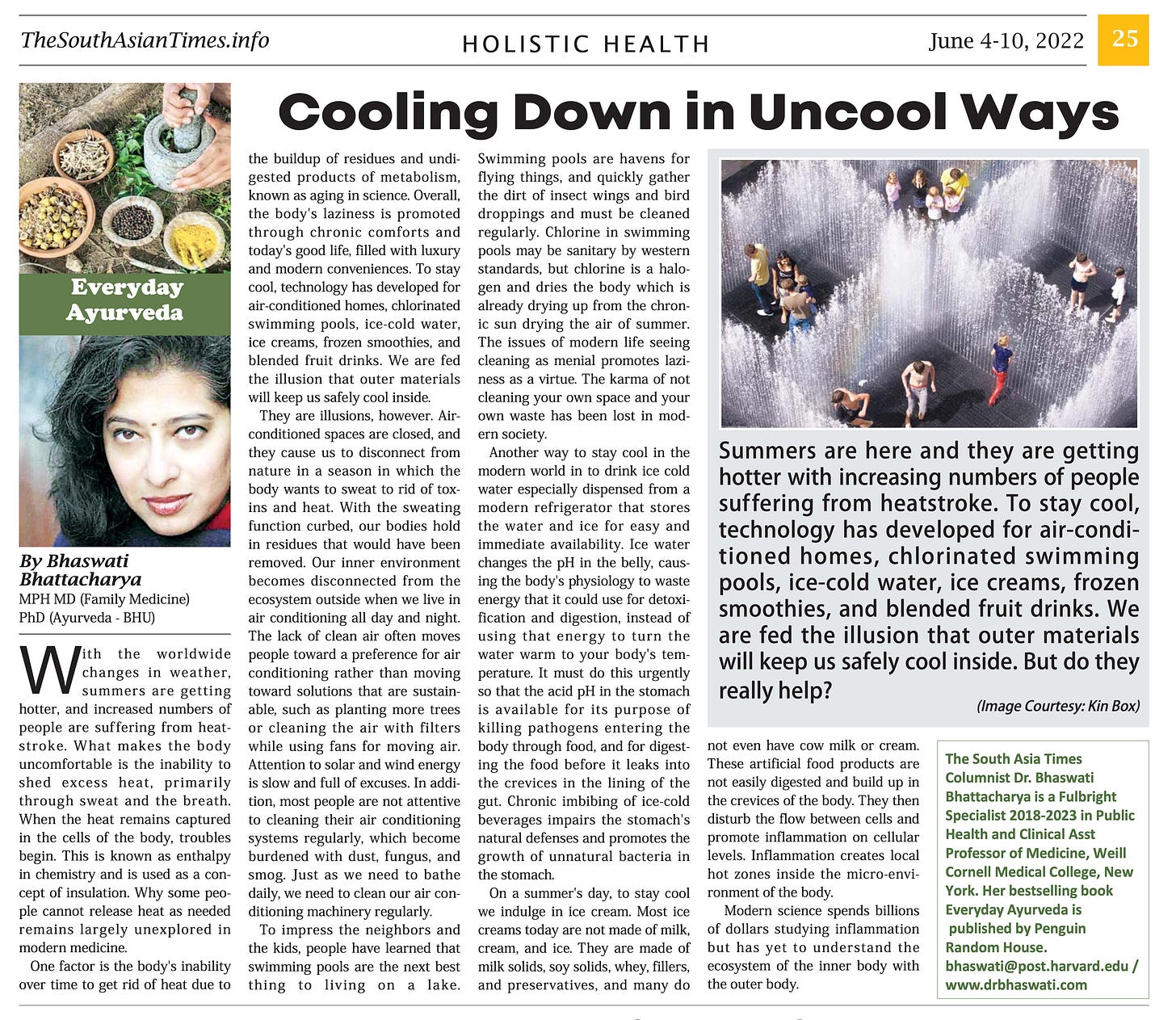Cooling Down in Uncool Ways
With the worldwide changes in weather, summers are getting hotter, and increased numbers of people are suffering from heatstroke. What makes the body uncomfortable is the inability to shed excess heat, primarily through sweat and the breath. When the heat remains captured in the cells of the body, troubles begin. This is known as enthalpy in chemistry and is used as a concept of insulation. Why some people cannot release heat as needed remains largely unexplored in modern medicine.
One factor is the body's inability over time to get rid of heat due to buildup of residues and undigested products of metabolism, known as aging in science. Overall, the body's laziness is promoted through chronic comforts and today's good life, filled with luxury and modern conveniences. To stay cool, technology has developed for air-conditioned homes, chlorinated swimming pools, ice cold water, ice creams, and frozen smoothies and blended fruit drinks. We are fed the illusion that outer materials will keep us safely cool inside.
They are illusions however. Air-conditioned spaces are closed, and they cause us to disconnect with nature in a season in which the body wants to sweat to rid toxins and heat. With the sweating function curbed, our bodies hold in residues that would have been removed. Our inner environment becomes disconnected from the ecosystem outside when we live in air conditioning all day and night. The lack of clean air often moves people toward preference for air conditioning rather than moving toward solutions that are sustainable, such as planting more trees or cleaning the air with filters while using fans for moving air. Attention to solar and wind energy is slow and full of excuses. In addition, most people are not attentive to cleaning their air conditioning systems regularly, which become burdened with dust, fungus and smog. Just as we need to bathe daily, we need to clean our air conditioning machinery regularly.
To impress the neighbors and the kids, people have learned that swimming pools are the next best thing to living on a lake. Swimming pools are havens for flying things, and quickly gather the dirt of insect wings and bird droppings and must be cleaned regularly. Chlorine in swimming pools may be sanitary by western standards, but chlorine is a halogen and dries the body which is already drying up from the chronic sun drying the air of summer. The issues of modern life seeing cleaning as menial promotes laziness as a virtue. The karma of not cleaning your own space and your own waste has been lost in modern society.
Another way to stay cool in the modern world in to drink ice cold water, especially dispensed from a modern refrigerator that stores the water and ice for easy and immediate availability. Ice water changes the pH in the belly, causing the body's physiology to waste energy that it could use for detoxification and digestion, instead of using that energy to turn the water warm to your body's temperature. It must do this urgently so that the acid pH in the stomach is available for its purpose of killing pathogens entering the body through food, and for digesting the food before it leaks into the crevices in the lining of the gut. Chronic imbibing of ice cold beverages impairs the stomach's natural defenses and promotes the growth of unnatural bacteria in the stomach.
On a summer's day, to stay cool we indulge in ice cream. Most ice creams today are not made of milk, cream, and ice. They are made of milk solids, soy solids, whey, fillers and preservatives, and many do not even have cow milk or cream. These artificial food products are not easily digested and build up in the crevices of the body. They then disturb the flow between cells and promote inflammation on cellular levels. Inflammation creates local hot zones inside the micro-environment of the body. Modern science spends billions of dollars studying inflammation but has yet to understand the ecosystem of the inner body with the outer body.
week 113. TheSouthAsianTimes
Download the .pdf version of this column by clicking on the image.
Dr. Bhaswati Bhattacharya is a Fulbright Specialist 2018‐2023 in Public Health, a family physician in the Department of Medicine at Weill Cornell Medical College in New York, NY, and holds doctorates in pharmacology and Ayurveda. She teaches ayurvedic nutrition on global platforms and cleans her channels regularly with sesame oil, mustard oil, and ghee.
Her bestselling book Everyday Ayurveda is published by Penguin Random House.
To order an autographed copy, write to bhaswati@post.harvard.edu.
To learn more, visit www.drbhaswati.com





